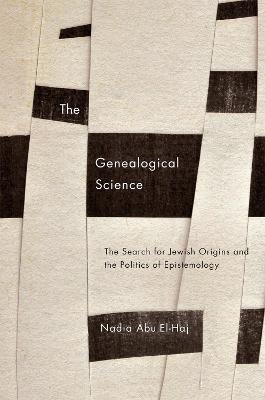
The Genealogical Science
The Search for Jewish Origins and the Politics of Epistemology
Seiten
2012
University of Chicago Press (Verlag)
978-0-226-20140-5 (ISBN)
University of Chicago Press (Verlag)
978-0-226-20140-5 (ISBN)
- Titel z.Zt. nicht lieferbar
- Versandkostenfrei innerhalb Deutschlands
- Auch auf Rechnung
- Verfügbarkeit in der Filiale vor Ort prüfen
- Artikel merken
Analyzes the scientific work and social implications of the flourishing field of genetic history. This book examines genetic history's working assumptions about culture and nature, identity and biology, and the individual and the collective.
"The Genealogical Science" analyzes the scientific work and social implications of the flourishing field of genetic history. A biological discipline that relies on genetic data in order to reconstruct the geographic origins of contemporary populations - their histories of migration and genealogical connections to other present-day groups - this historical science is garnering ever more credibility and social reach, in large part due to a growing industry in ancestry testing. In this book, Nadia Abu El-Haj examines genetic history's working assumptions about culture and nature, identity and biology, and the individual and the collective. Through the example of the study of Jewish origins, she explores novel cultural and political practices that are emerging as genetic history's claims and "facts" circulate in the public domain, going on to illustrate how this historical science is intrinsically entangled with cultural imaginations and political commitments.
Chronicling late nineteenth- to mid-twentieth-century understandings of race, nature, and culture, she identifies continuities and shifts in scientific claims, institutional contexts, and political worlds in order to show how the meanings of biological difference have changed over time. In doing so, she gives an account of how and why it is that genetic history is so socially felicitous today and elucidates the range of understandings of the self-individual and collective - that this scientific field is making possible. More specifically, through her focus on the history of projects of Jewish self-fashioning that have taken place on the terrain of the biological sciences, "The Genealogical Science" analyzes genetic history as the latest iteration of a cultural and political practice now over a century old.
"The Genealogical Science" analyzes the scientific work and social implications of the flourishing field of genetic history. A biological discipline that relies on genetic data in order to reconstruct the geographic origins of contemporary populations - their histories of migration and genealogical connections to other present-day groups - this historical science is garnering ever more credibility and social reach, in large part due to a growing industry in ancestry testing. In this book, Nadia Abu El-Haj examines genetic history's working assumptions about culture and nature, identity and biology, and the individual and the collective. Through the example of the study of Jewish origins, she explores novel cultural and political practices that are emerging as genetic history's claims and "facts" circulate in the public domain, going on to illustrate how this historical science is intrinsically entangled with cultural imaginations and political commitments.
Chronicling late nineteenth- to mid-twentieth-century understandings of race, nature, and culture, she identifies continuities and shifts in scientific claims, institutional contexts, and political worlds in order to show how the meanings of biological difference have changed over time. In doing so, she gives an account of how and why it is that genetic history is so socially felicitous today and elucidates the range of understandings of the self-individual and collective - that this scientific field is making possible. More specifically, through her focus on the history of projects of Jewish self-fashioning that have taken place on the terrain of the biological sciences, "The Genealogical Science" analyzes genetic history as the latest iteration of a cultural and political practice now over a century old.
Nadia Abu El-Haj is professor of anthropology at Barnard College of Columbia University. She is the author of Facts on the Ground: Archaeological Practice and Territorial Self-Fashioning in Israeli Society, also published by the University of Chicago Press.
| Erscheint lt. Verlag | 11.5.2012 |
|---|---|
| Reihe/Serie | Chicago Studies in Practices of Meaning |
| Sprache | englisch |
| Maße | 16 x 23 mm |
| Gewicht | 567 g |
| Themenwelt | Sachbuch/Ratgeber ► Natur / Technik ► Naturführer |
| Naturwissenschaften ► Biologie ► Genetik / Molekularbiologie | |
| Sozialwissenschaften ► Ethnologie | |
| Sozialwissenschaften ► Soziologie ► Spezielle Soziologien | |
| ISBN-10 | 0-226-20140-6 / 0226201406 |
| ISBN-13 | 978-0-226-20140-5 / 9780226201405 |
| Zustand | Neuware |
| Haben Sie eine Frage zum Produkt? |
Mehr entdecken
aus dem Bereich
aus dem Bereich
Buch | Hardcover (2019)
Quelle & Meyer (Verlag)
39,95 €
Botanik, Ethnopharmakologie und Anwendung
Buch | Hardcover (2022)
at Verlag
139,00 €


